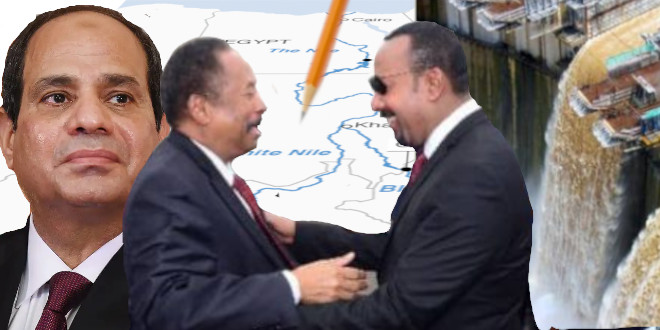Gloomy Clouds Over the Horn of Africa

Abdella Hamdouk: Last year, the Sudanese Sovereignty Council appointed Abdella Hamdouk as a prime minister. He was sworn in on 21 August 2019. Roughly seven months later, on Monday, March 9, 2020, Hamdouk survived an assassination attempt when an explosion in Khartoum went off and damaged his car as he drove to his office. The Sudanese prosecutor stated the attack was “professionally plotted”. However, it’s widely believed the attempt was shabby and hastily planned.
Last year, a popular uprising forced the army to unseat Omar AlBashir, Sudan’s dictator since 1989. A joint military and civil administration took over and the Sovereignty council that appointed Hamdouk to lead a traditional government that recently decided to hand over Omar Al Bashir and others to the International Criminal Court to face charges over the Darfur genocide.
Facing and internal opposition entrenched politicians, some loyal to Omar Albashir and his party, Hamdok’s government has also to navigate through the region’s unstable political situation. Last January the Sudanese security forces quelled a small armed revolt which General Salah Gosh, the ex security chief, allegedly masterminded. The General reportedly lives in Egypt and frequently travels to Eritrea.
Abiy Ahmed: Ethiopia will hold a multi-party election on August 16, 2020 amid serious security concerns. The polarized country is going through precarious situation mainly ethnic strife and sectarian conflicts. In addition, the Tigray region is under huge pressure from nationalists contemplating Secession from the Ethiopian state. If Abiy’s government continues to deny the perceived and real opposition a maneuvering space, the result could inflict a far reaching damage on the country.
Recently security forces denied permission to Abiy’s opponents to hold a rally with an excuse that campaigning date was not yet due. However, Abiy’s Prosperity Party held a rally despite banning its rivals from doing so. Such actions are casting doubts on the country’s ability to carryout a peaceful and fair election. The rivalry is expected to be mainly between parties that want to keep the federal arrangement against Abiy’s ruling party that advocates for a unitary state.
As the election date approaches, the nervous cloud engulfing all parts of Ethiopia is getting heavier. The Tigray government is countering the pressure from Abiy’s government by making gestures towards Eritrea, its Northern neighbor. Dr. Debretsion, the Deputy President of Tigrai, “ called on the people of Eritrea to work towards peace and reconciliation” with their brethren across the Mereb river which separates Eritrea from the Tigrai region. However, the two governments have been living in a no-peace-no-war situation following the 1998-2000 bloody border war between the two countries.
The visible conflict between Tigrai region and Abiy Ahmed started soon after the latter gained power and immediately started campaigning against officials of the Tigrai region calling them “Yeqen Jiboch” (Daylight Hyenas) a negative epithet he coined to describe Tigraian officials. That campaign led to the arrest and abuse of of many Tigraians all over Ethiopia. In response, Tigraian intellectuals started to discredit his rule and are now calling the prime minister, “Colonel Abiy”, dropping the often used title of “Dr. Abiy” from his name. Many Ethiopians doubt if Abiy ever earned a PhD.
The Dam over River Abay
The construction of GERD began in 2011 under the late prime minister Meles Zenawi who died a year later. GERD is the biggest project in the history of Ethiopia and when completed, it will be Africa’s biggest hydroelectric power plant and Egypt is worried about water supply shortage. About 85% of the Nile water is carried by the Abay River (Blue Nile) from the Ethiopian highlands and Egypt depends on the Nile for 90% of its needs. Ethiopian-Egyptian disagreements over the control of the Nile has a long history by the current cycle escalating under President Mursi.
In 2013, Mohammed Mursi held a meeting with a selected group of influential Egyptians and discussed ways to deal with Ethiopia over the Nile Crisis. The recording was leaked and it was translated into English by awate.com at the time, and it exposed Egypt’s plans to use the Eritreans government and the Ethiopian Oromos to destabilize Ethiopia. Soon, Mursi who belonged to the Muslim Brotherhood, was overthrown by the Egyptian military under the leadership of AlSisi, with the support of both Saudi Arabia and the UAE. Now AlSisi repeatedly blames Mursi for enabling Ethiopia to go this far in constructing the dam.
The Nile water has always been an effective political rallying tool for both countries and that is exasperating the situation. At the moment, Egypt has more serious problems like unemployment, lack of freedoms, and price hikes of consumer supplies, but the Nile agitation diverts the focus of the public away from the real issues. An Ethiopian scholar said, “Colonel Abiy must have learned AlSisi’s trick of diverting public attention by using the Nile scare… we have full rights over the water that flows out of out territories.” Until recently, Prime Minister Abiy downplayed the importance of GERD, now he is “milking the crisis for his benefit, in similar ways to that of AlSisi.” More such accusations are expected as the Ethiopian election date approaches. Ethiopians are apprehensive of the failure of Abiy’s government to resolve the case surrounding the mysterious death of Engineer Simegnew Bekele, the Gerd project manager of Gerd. On July 26, 2018, he was found dead with in his car in Addis Ababa, with a shot to his head in Addis Ababa.
Filling the Thirsty Blue Nile Reservoir
The reservoir requires over 7 billion cubic meters of water to fill. So far, the the USA mediation between Egypt and Ethiopia, to reach an agreement over the timetable for filling the dam reservoir, has not been successful. While Ethiopia plans to fill the reservoir in four years, Egypt insisting on stretching the time to about “12 to 21 years”. But the Ethiopian minister of Water said the filling will start in the next rainy season and start generating electricity with two turbines out of the 13 turbines that produce 6,000 megawatts of electricity. An observer said, “the controversy can be resolved only if the parties treat the filling timetable as a technical issue and stop using it for propaganda as a political rallying tool.” So far, that advise has not found ears and the leaders have escalated the differences to new political heights.
Egypt has reverted to its 2013 rhetoric and has involved the Arab League which endorsed its position by declaring it recognizes “Egypt’s rights” over the Nile water. That endorsement provoked a strong reaction from Ethiopia which rejected the Arab League resolution “in its entirety”, and also lambasted the USA of siding with Egypt. Like they did to the above advise, the two countries have also ignored a well-known wisdom: involving a third party in a difference of a bilateral nature complicates matters, particularly when technical issues are politicized to serve populist motives, which both countries are guilty of.
Target Hamdouk
Though a member of the Arab League, Sudan has complicated the matter by refusing to endorse the Arab League resolution and siding with Ethiopia. The badly (or hastily planned) attempt on the life of prime minister Hamdouk is probably an expression of disapproval of Sudan’s position, and a warning to Hamdouk to fall in line. However, it’s evident that more countries in the region are using the Nile crisis that Ethiopia and Egypt failed to resolve amicably, as a political opportunity to expand their influence and serve their interests.
Unconfirmed reports indicate that Sudan has already arrested a native of one of the countries of the region in connection with the attack on Hamdouk. According to unconfirmed reports, the person who is reportedly under custody has arrived to Khartoum a few days before the assassination attempt was carried out.
Isaias Afwerki Is Somewhere There!
It seems Ethiopia’s only loyal supporter is Sudan while Egypt is backed by the Arab League and the USA, in addition to the UAE and Saudi Arabia. Both countries have a critical financial leverage over most of the region’s countries. And this highlights the mysterious role of Isaias Afwerki, Eritrea’s dictator who has unilaterally signed a peace agreement with “Colonel Abiy”, his ally who wants to corner the Tigray regional government into submission. Isaias doesn’t have any loyalty towards Abiy Ahmed or Ethiopia but wants to destroy the TPLF, the Tigray ruling party, and he has been trying to accomplish for over two decades. The TPLF and the PFDJ (Eritrean ruling party) have been enemies for decades and Abiy jumped into the fry convinced that the removal of the TPLF will give him an opportunity to consolidate his power. That plan is going nowhere.




Awate Forum